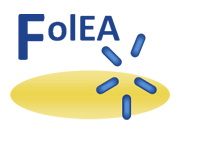This project is coordinated by IRD, Institut de Recherche pour le Développement
NUTRIPASS unit "Food and Nutrition Research in the Global South"
UMR Nutripass, 911 avenue Agropolis, BP 64501 34394 Montpellier Cedex, FRANCE
Christèle HUMBLOT , Coordinator
Tel : + 33 (0)4 67 41 62 48
Fax: + 33 (0)4 67 41 61 57
For the FolEA partners only: you can sign in to access the "private area", with more information on the project, and access to the documents.
A password is needed (contact Youna Hemery to get your login & password).
Work-package 3
WP3: Identification of the folate sources in African and European diets
Leader : Dr Susanna Kariluoto (Finland)
Co-leader : Dr Youna Hemery (France)
The main objective of this WP is to measure the amount of folates produced in the different CBFFs by the microorganisms, and to evaluate the bioaccessibility and bioavailability of these produced folates, in order to determine the potential contribution of CBFFs to the dietary requirements.
This WP is structured in three Tasks:
Task 3.1: Folate content of cereal-based fermented foods
The total folate content of the different selected CBFFs will be determined, as well as the folate content of the initial cereal grains used to produce the food products. A reference microbiological method will be used, after trienzyme extraction. We will work on the same samples than those used for the metagenomic analysis (WP2) in order to establish correlations between the folate content of the various CBFFs and the genetic equipment of the microorganisms responsible for the fermentation.
Task 3.2: Identification of vitamers
The various vitamers (i.e. folate forms) initially present in the cereal matrix, and those produced by LAB during fermentation, will be identified and quantified by liquid chromatography, after affinity chromatography purification. These analyses will be restrained to a small number of samples: naturally fermented samples and products inoculated with the most active strains.
Task 3.3: Bioaccessibility or bioavailability assays
The bioaccessibility of folates (i.e. proportion of folates released from the food matrix and available for enzymatic deconjugation and absorption) will be estimated before and after fermentation using a 3-steps in vitro digestion model that simulates the first steps of human digestion. We will work on naturally fermented samples as well as on samples inoculated with the most active folate-producing bacteria. The bioavailability (i.e.actual absorption and bioactivity) of folates might also be measured in vivo using a rat model, for the most interesting conditions, if optimized CBFFs with high folate production are obtained.
Expected results: the combination of these approaches will allow better understanding of the parameters influencing the bioaccessibility / bioavailability of folate from cereal foods, and evaluating the potential effect of CBFF consumption for increasing the folate status.











